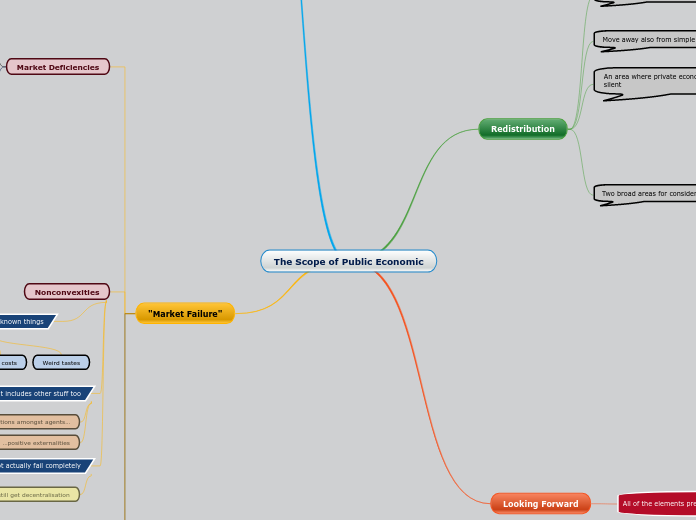The Scope of Public Economic
Redistribution
Move away from private-only model
Slightly odd preoccupation
Define public economics as a “complement”
Move away also from simple efficiency
Pareto criterion
Potential Pareto
An area where private economy approach is (almost)
silent
Two broad areas for consideration
Motivation
Normative economics
Constitution approach
Basic principles: approach
SWF approach
Implementation
asymmetric information
design
Looking Forward
All of the elements presented here play a role
Begin with motivation
Welfare analysis of redistribution
Equity, social welfare and taxation
We make repeated visits to the problem of design
Policy design: social insurance
Optimal taxation
The Private Economy
The Adam Smith result is fairly demanding
Competitive Failure and Efficiency
The market “failures” raise two classes of problem
The characterisation problem
The implementation problem
"Market Failure"
Market Deficiencies
1
Distorted markets
Monopoly
Restrictive practices
Missing markets
Futures? Risk?
Highly specialised commodities
Thin markets
Not enough traders
Highly specialised commodities
Problems of information
Imperfect / incomplete
Asymmetric
2
Distorted markets
Monopoly / Anti trust legislation
Missing markets
Pension / social security provisions
Internal markets in health
Thin markets
Franchising
Private finance initiatives
Problems of information
Regulation
Nonconvexities
Covers many well-known things
Increasing returns
Fixed costs
Weird tastes
But includes other stuff too
Interactions amongst agents…
…positive externalities
The market may not actually fail completely
Could still get decentralisation
Externalities
Production externalities
One firm influences another’s production conditions
Model this as a parameter shift
Consumption externalities
One agent’s consumption of a good directly affects
another
Related to the analysis of public goods
Consumption externalities can be seen as qualitatively
different
Public consumption
Characteristics
Excludability
Rivalness
